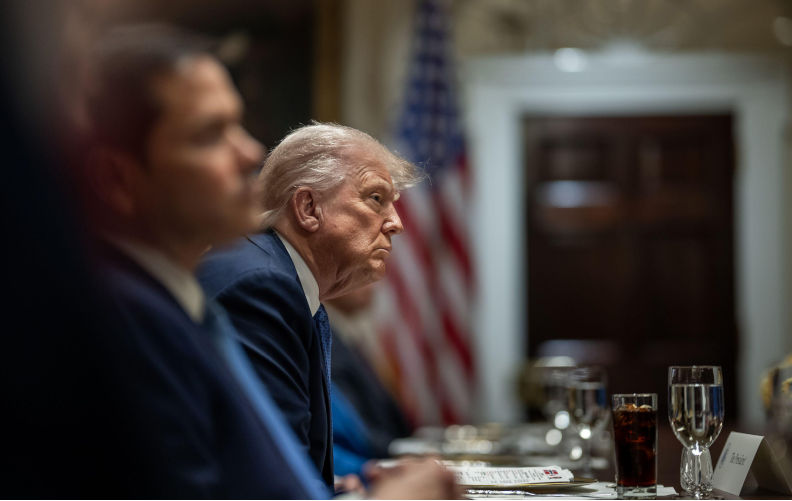Greg Sheridan piles on the Murdoch delusions
May 25, 2025
While Paul Kelly has written wisely about Donald Trump, many of his Murdoch colleagues appear discombobulated by the real estate developer’s return to the US presidency. Who can blame them? They’re not alone.
As a conservative, if a wildly radical one, Trump might reasonably expect a fair welcome at News Corp, the awkwardness of his amorality, selfishness, cruelty and incompetence notwithstanding. Yet, it’s unlikely Trump has ever been a comfortable bed-fellow for anyone and in the Murdoch chambers he appears to be causing delusions in some of its denizens.
Greg Sheridan, whose reputation for self-restraint and sound judgment is more modest than many, may be suffering from Trump Disorientation Syndrome.
His recent article in The Australian newspaper titled “The good, the bad and the ugly of Trump’s Middle East tour” shows troubling symptoms. In it, the author has two bob each way on just about everything, ending up in a morass of non-sequiturs sufficient to leave even patient readers gasping for breath.
Sheridan says Trump’s recent “tour of the Middle East may yet go down as one of the most significant and productive interventions by an American president in the troubled region’s history” or “it may deflate into more or less a nothing burger.” Well, that would seem, however unhelpfully, to approximately cover the full range of possibilities.
Sheridan leads with his jaw in claiming that, “The challenge for any genuine analysis of the Trump administration is to recognise that the good Trump can be outstandingly good but coexists with the bad Trump, who can be outstandingly bad". Beg your pardon? Can Sheridan list 10 outstandingly good things Trump has done while president? But even if he can, he needs to know any good in Trump is greatly outweighed by the bad and he should keep that solidly in mind.
“On Iran” Sheridan says, “it’s unclear if Trump will get Tehran to stop enriching uranium, in which case he’s a genius….”. Let’s remember Trump’s failure, despite much self-promotion, to get North Korea to give up its nuclear weapons. In that theatre of the absurd, Trump’s chances were close to zero and proved to be even less than that. Getting Iran to stop enriching uranium for any purpose must be at similar odds but if he were to succeed against them, that would not make him a “genius” – he would remain as he was and, in the reported assessment of Sheridan’s employer Rupert Murdoch, a “moron”.
Unphased by such nonsense, Sheridan ploughs on to say that, “The rational case for Trump’s approach is that US democracy promotion has been over-prescriptive and not very successful in the past 30 years". Really? The rational case for Trump’s foreign policy must be justified in its own terms and to claim that its merits lie in its difference from policies that have not succeeded is an illogicality analysts with any self-regard should avoid.
It doesn’t get any better when Sheridan gets to Trump’s troubled relationship with the truth.
“The defence of Trump’s personal actions is that his very brazenness is a kind of honesty,” Sheridan writes. It’s unlikely that defence ever occurred to Al Capone who would have knowns that thickly laying on brazenness doesn’t make lies the truth. Sheridan’s assertion is that in Trump’s case, it can reflect a disordered struggle to find nice things to say about the president.
He then compounds his moral confusion, saying that, “In a sense Trump lies all the time… but in a way is never really lying because everyone knows what he’s saying often isn’t true and he knows they know.”
Well, while he’s a first-rate fibber, Trump doesn’t lie all the time, but the idea he’s never really lying because everyone knows he is leads to a moral cesspit from which there may be no exit. If Trump were to try this Sheridan segue when he gets to Heaven’s gates, he would get the rebuff of his life.
Concluding with a flourish, Sheridan says, “The policy outcome will be the difference that counts.” Whatever that means, even if against the odds Trump contributes to a better Middle East, including helping to end the Israeli genocide in Gaza, that will not, as Sheridan implies, excuse Trump’s arrogant dishonesty and corruption.
But Sheridan’s “analysis” is not merely a matter of illogicality and semantics.
It’s near impossible for Trump to be “very good” and to deal with him on that basis would be extremely risky.
He’s grounded US foreign policy in the fatuity of his election slogan to “Make America Great Again” and allowed his bigoted ego to direct that policy and have it implemented by vulnerable cronies who dare not contradict him.
Trump’s version of America First has greatly reduced the scope for any country to pursue mutual self-interest with the US.
No mawkish satisfaction should be drawn from any “warm” telephone chats with the president as he is as likely as not to turn viciously and unfairly on friends if the mood takes him. Just ask Cyril Ramaphosa.
Trump has made the United States a selfish, unpredictable and unreliable ally and Australia should adjust its foreign policy accordingly. It should keep an appropriate distance and realise that sucking up will likely make matters worse. It should look for closer relationships with other countries, especially in its region, but also in Europe. It should develop least cost options for selective disengagement with the United States, especially on matters where closeness could get up the noses of other allies. Extrication from AUKUS and the spending of some of its hundreds of billions on more effective conventional submarines delivered well before 2050 would be a good start. Whatever, Sheridan should be left to his own devices.
The views expressed in this article may or may not reflect those of Pearls and Irritations.

